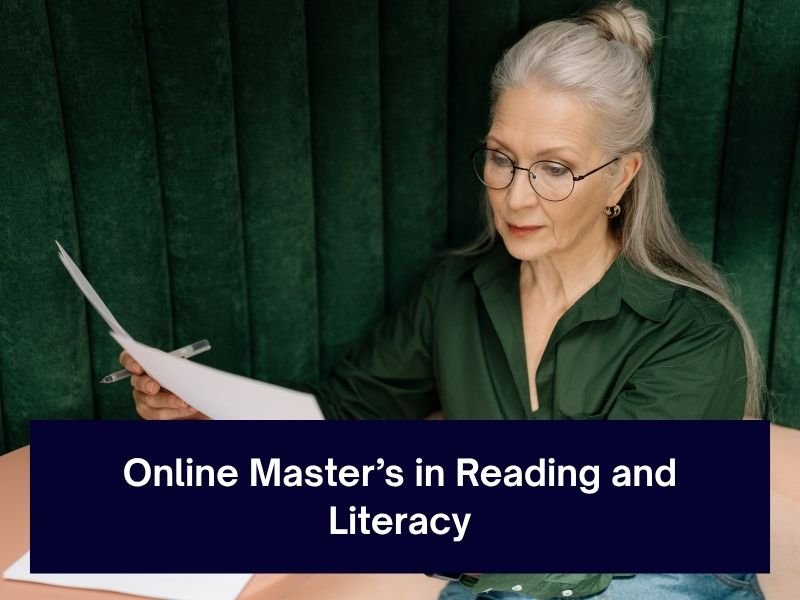As the demand for skilled literacy educators grows, online master’s programs in reading and literacy offer flexible, high-quality pathways for teachers to advance their careers. These programs equip educators with the skills to teach reading, assess literacy challenges, and design effective curricula, preparing them for impactful roles in K-12 education and beyond. This article explores the top online master’s programs for 2025, career opportunities, salary potential, and key considerations for choosing the right program, drawing from trusted sources like BestColleges.com, U.S. News, and program-specific data.
Why Pursue a Master’s in Reading and Literacy?
A master’s in reading and literacy empowers educators to make a lasting impact on students’ lives by fostering essential reading and writing skills. According to literacy expert Kathryn Starke, “The degree allows someone to become a reading teacher, reading specialist, and literacy coach. Administrators with a degree in literacy and reading can help their school succeed in reading as well.” Key benefits include:
-
Career Advancement: Graduates qualify for specialized roles like reading specialists, literacy coaches, or instructional coordinators, often with higher pay and leadership opportunities.
-
Increased Earning Potential: Teachers with a master’s degree earn about 16% more annually than those with a bachelor’s, per the National Center for Education Statistics (NCES).
-
Student Impact: Mastery of literacy instruction helps students develop lifelong skills, addressing declining reading scores among K-12 students.
-
Flexibility of Online Learning: Online programs offer asynchronous coursework, allowing working educators to balance studies with professional and personal responsibilities.
Top Online Master’s in Reading and Literacy Programs for 2025
Based on data from BestColleges.com, which ranks programs using metrics like affordability, student outcomes, reputation, and diversity, here are the top 10 online master’s programs for 2025, with tuition details and key features.
-
Clemson University (Clemson, SC)
- Tuition: $10,858 (in-state), $22,566 (out-of-state)
- Acceptance Rate: 38%
- Online Enrollment: 44%
- Highlights: Affordable for in-state students, with a focus on practical literacy instruction and flexible online coursework.
-
University of Georgia (Athens, GA)
- Tuition: $8,878 (in-state), $25,186 (out-of-state)
- Acceptance Rate: 37%
- Online Enrollment: 20%
- Highlights: Offers robust curriculum development training, though out-of-state tuition is higher.
-
University of Florida (Gainesville, FL)
- Tuition: $10,770 (in-state), $27,335 (out-of-state)
- Acceptance Rate: 24%
- Online Enrollment: 57%
- Highlights: High online enrollment and strong faculty support, ideal for working professionals.
-
University of North Carolina at Charlotte (Charlotte, NC)
- Tuition: $4,337 (in-state), $18,482 (out-of-state)
- Acceptance Rate: 80%
- Online Enrollment: 56%
- Highlights: Most affordable in-state tuition, with a high acceptance rate and flexible scheduling.
-
Saint Joseph’s University (Philadelphia, PA)
- Tuition: $18,504 (in-state and out-of-state)
- Acceptance Rate: 86%
- Online Enrollment: 43%
- Highlights: Strong focus on literacy coaching and leadership, with a competitive tuition rate for a private institution.
-
University of South Florida (Tampa, FL)
- Tuition: $8,350 (in-state), $19,048 (out-of-state)
- Acceptance Rate: 41%
- Online Enrollment: 67%
- Highlights: High online enrollment and affordable in-state tuition, with emphasis on practical applications.
-
SUNY Oneonta (Oneonta, NY)
- Tuition: $11,310 (in-state), $23,100 (out-of-state)
- Acceptance Rate: 70%
- Online Enrollment: 22%
- Highlights: Ranked #18 in 2022, offers literacy clinics and eligibility for New York professional teaching certification.
-
SUNY at Albany (Albany, NY)
- Tuition: $11,310 (in-state), $23,100 (out-of-state)
- Acceptance Rate: 70%
- Online Enrollment: 40%
- Highlights: Offers literacy specialist certification, with a strong ROI for graduates ($520,056 lifetime adjusted).
-
East Carolina University (Greenville, NC)
- Tuition: $4,749 (in-state), $17,898 (out-of-state)
- Acceptance Rate: 90%
- Online Enrollment: 72%
- Highlights: Highly affordable, with a 30-hour M.A. program and practicum for K-12 reading specialists.
-
Endicott College (Beverly, MA)
- Tuition: $13,084 (in-state and out-of-state)
- Acceptance Rate: 73%
- Online Enrollment: 40%
- Highlights: Flexible online format with a focus on practical literacy interventions.
Additional Notable Programs
-
Ohio University (Athens, OH): A 31-credit M.Ed. ranked #1 by Intelligent.com for 2024, fully online, asynchronous, and completed in three semesters. Aligns with Ohio’s Science of Reading Standards and qualifies graduates for a reading endorsement.
-
University of North Dakota (Grand Forks, ND): Offers M.Ed. and M.S. options, with a focus on literacy instruction and assessment. Highly affordable and accredited by the Higher Learning Commission.
-
Illinois State University (Normal, IL): A 36-hour M.S. Ed. program, fully online, designed for K-12 educators, with a competitive curriculum for reading specialists.
-
California State University, Fullerton (Fullerton, CA): Ranked #4 nationally, offers a 30-unit M.S. with Reading and Literacy Added Authorization and Specialist Credential, fully online and bisynchronous.
-
Texas Woman’s University (Denton, TX): Focuses on women’s leadership, with a cohort-based M.Ed. and optional K-12 Reading Specialist Certification.
-
California State University, San Marcos (San Marcos, CA): A 16-month M.A. with Reading and Literacy Added Authorization and Specialist Credential, emphasizing social justice and multilingual learners.
-
UMass Lowell (Lowell, MA): M.Ed. in Language Arts and Literacy, fully online, with practicum experiences and eligibility for Massachusetts Reading Specialist licensure.,
-
Adelphi University (Garden City, NY): Offers hands-on experience through its Literacy Center, preparing graduates for New York State certification exams.
-
Louisiana State University Shreveport (Shreveport, LA): M.Ed. in Curriculum and Instruction with a Reading and Literacy concentration, offering add-on certification for certified teachers.
-
University of Cincinnati (Cincinnati, OH): M.Ed. in Literacy and Second Language Studies, with a TESOL concentration option, ideal for ESL educators.
Program Features and Curriculum
Online master’s programs in reading and literacy typically require 30-36 credit hours and take 1-3 years to complete, depending on full- or part-time enrollment. Common courses include:
-
Foundations of Literacy: Theories and methods for teaching reading.
-
Literacy Assessment: Techniques for diagnosing reading difficulties.
-
Curriculum Design: Developing reading and writing programs.
-
Language Acquisition: Understanding first and second language development.
-
Practicum/Clinical Experiences: Hands-on teaching or tutoring, often required for certification.,
Many programs offer concentrations such as:
-
Early Literacy
-
English as a Second Language (ESL)
-
Literacy Coaching
-
Curriculum Development
-
Reading Specialist,
Programs often align with state standards, like Ohio’s Science of Reading or California’s Reading and Literacy Added Authorization, ensuring graduates are certification-ready.,
Career Paths and Salary Outlook
A master’s in reading and literacy opens diverse career paths in education and related fields. According to the U.S. Bureau of Labor Statistics (BLS) and other sources, here are key roles and their median annual salaries (2023-2024 data):
-
Reading Specialist: Develops curricula and provides targeted interventions. Salary: $42,000-$80,000 (average $64,450).,
-
Instructional Coordinator: Designs and evaluates curricula. Salary: $74,620.
-
Literacy Coach: Supports teachers in literacy instruction. Salary: $68,000-$72,000 (e.g., Albany, NY).
-
Kindergarten/Elementary School Teacher: Teaches foundational skills. Salary: $62,340-$68,000.,
-
High School Teacher: Focuses on advanced literacy. Salary: $61,820.
-
ESL Teacher: Supports English language learners. Salary: $60,560.
-
Special Education Teacher: Addresses unique literacy needs. Salary: Varies, often $60,000+.
-
Education Administrator: Oversees school programs. Salary: $103,960.
-
Adjunct Faculty: Teaches literacy courses at colleges. Salary: Varies, often $50,000-$80,000 part-time.
-
Curriculum Developer: Creates educational materials. Salary: $60,000-$80,000.
The average salary for graduates with a master’s in reading and literacy is $55,000, with top earners reaching $117,000 based on role, location, and experience. Job growth for education roles is projected at 10% through 2030, adding over 920,500 jobs, driven by the need to address literacy challenges.
Cost and Financial Aid
The average annual tuition for online master’s programs in education is $7,912, with public institutions averaging $12,596 and private institutions $28,017., Specific program costs include:
-
Clemson University: $15,450 (out-of-state, total).
-
University of Georgia: $22,644 (out-of-state, total).
-
East Carolina University: $7,044/year (in-state).
-
University of North Dakota: Affordable, with high ROI.
Financial aid options include:
-
FAFSA: Grants, loans, and work-study programs.
-
Scholarships: Program-specific awards, like those at ECU or TWU,
-
Employer Funding: Many schools offer tuition reimbursement for teachers.
-
Fee Waivers: Available for groups like McNair Scholars or alumni (e.g., TWU).
Admission Requirements
Common admission requirements include:
-
Bachelor’s Degree: From an accredited institution, often with a minimum GPA of 2.5-3.0.,
-
Teaching Certification: Required for some programs, especially those leading to specialist credentials.,
-
Application Materials: Transcripts, resume, personal statement, and 1-3 letters of recommendation.
-
GRE: Optional or not required for most programs (e.g., Ohio University, LSU Shreveport).,
-
Experience: Some programs prefer or require classroom teaching experience.
Check specific program websites for deadlines and additional requirements, as some, like CSUSM, accept applications on a rolling basis.
Choosing the Right Program
When selecting a program, consider:
-
Accreditation: Ensure the institution is regionally accredited (e.g., by the Higher Learning Commission) and, for teaching-focused programs, accredited by the Council for the Accreditation of Educator Preparation (CAEP).,
-
Certification Alignment: Programs like SUNY Oneonta or CSUF align with state-specific credentials, such as New York’s professional certification or California’s Reading and Literacy Added Authorization.,
-
Format and Flexibility: Look for asynchronous options (e.g., Ohio University, UND) or bisynchronous programs (e.g., CSUF) to suit your schedule.,
-
Cost vs. ROI: SUNY Albany offers a high lifetime ROI ($520,056 adjusted), while others like Alfred University outperform in teacher education ROI ($648,672).
-
Faculty Support: Programs like ECU and Adelphi emphasize experienced faculty and mentorship.,
-
Concentrations: Choose a program matching your career goals, such as ESL, early literacy, or leadership.
Tips for Success
-
Research Thoroughly: Use program websites and contact admissions counselors to clarify requirements and deadlines.
-
Highlight Experience: Emphasize teaching or literacy-related experience in your application.
-
Plan Finances: Apply for FAFSA and program-specific scholarships early to reduce costs.
-
Leverage Networks: Engage with faculty and peers in cohort-based programs (e.g., TWU, CSUSM) for professional connections.,
-
Prepare for Certification: If aiming for a reading specialist license (e.g., in Massachusetts or Ohio), ensure the program meets state exam requirements.,
Conclusion
A master’s in reading and literacy is a powerful step for educators seeking to specialize in literacy instruction, advance to leadership roles, or increase their earning potential. Top programs like those at Clemson, Ohio University, and East Carolina University offer affordable, flexible, and accredited pathways to careers as reading specialists, literacy coaches, or instructional coordinators, with salaries ranging from $55,000 to $117,000. With strong job growth projected and a clear need for literacy experts, now is the time to invest in your future. Visit program websites, such as those for Ohio University or SUNY Oneonta, to apply and start shaping the next generation of readers.









